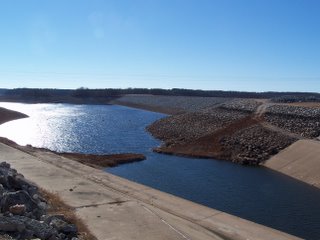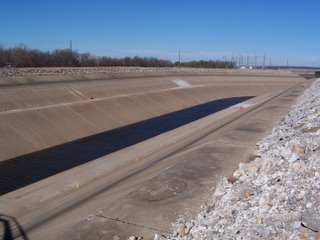Every now and then an issue comes along for which the announced solution is not pleasant. And that is the case with lowering Grand Lake to elevation 738 in the middle of the second worst draught in the state's history, to fill another lake that was drawn down in the same draught, for Federally-mandated purposes.
FERC, that strange bunch in Washington, makes decisions based on timetables without any thought as to reality. They mandate that the W.R. Holway Reservoir be drained down every five years for inspections and maintenance.
And so it was done in September and now the work is completed and the reservoir is being filled as we speak. It fills from Lake Hudson, which lies below, via a pump-back engineering system so that the water can be used twice…once down, and back up, reversing the turbines. A great engineering concept that works, when the lakes are full.
W.R. Holway Reservoir was named after the chief engineer that built the Pensacola Dam, the coal fired plant at Pryor, and the Salina pump-back project. It is 180 feet deep in some places.
It needs about 40 vertical feet of water to fill back up. One can only wonder where all the water went when it was drained in September.
Generation at all three GRDA hydro facilities has been at a standstill since September, when Grand Lake was drawn down to fulfill another FERC mandate, the planting of Japanese Millet to feed ducks who might fly over. Two feet of water disappeared in two weeks.
In the draught, we wonder how this Millet is working, since the lake did not come back up and we had no rain. Even weeds need water. Another Federal program that needs to go away.
So now to fill Lake Hudson we must drain Grand Lake and affect 18,000 waterfront property owners, their docks, lifts, water pumps, shoreline erosion, fire fighting capabilities, and more. And in the middle of this six year draught.
If W.R. Holway Reservoir has been dry for five months, what's another two or three? Why try to fill it now. Let's wait until April and see if we get some rain.
We can only assume that there is more here than meets the eye, and somehow megawatts has something to do with it.
Fortunately, in 1957 the Grand Lake Association under the leadership of Jim Swinney of Monkey Island, had the legislature pass the law that says GRDA cannot draw down the lake below 735 elevation, as they did in the 1950's to elevation 712.
Now if you want to see a lake in crisis, you should have been here for that one. No need for bridges across Honey Creek…you could walk on the mud and stumps.
There are a few people who say go ahead and wreck the recreation, the lake was built for flood control and power generation. (The turbines will run to elevation 715, although not very efficiently.)
But the lake developed into the engine that drives the economy of five counties in NE Oklahoma, through recreation, which now shares equal importance with flood control and power generation.
Insufficient notice has been given to dock owners; with only a handfull of dock companies on the lake, it is unlikely that everyone will get his dock moved by late January. Moving docks is not something the ordinary homeowner should tackle either. In the small coves there will be hundreds of lifts that won't go down, including GRDA CEO Kevin Easley's. There will be hundreds of boats in association or multiple slip docks that will be dry. Many cannot be moved because there is no place for them to go. If no rain falls from now through summer, an economic disaster for the lake area will occur.
We recall the 1950's, when we moved our dock every weekend down the cove towards Duck Creek. Since nobody lived there we could do so without asking. The draught lasted three years and we walked nearly a mile to and from the boat dock, built of oil drums and 2x4's. Our water supply to the cabin dried up so we rigged up a cistern draining from the roof to store rainwater, when it rained. We built a boat lift using pulleys and chains. There was not much on Duck Creek but the Cherokee Yacht Club which had a small dock in the cove. Harbors View was on dry land. Most marinas went broke.
We lived through it but Dad always referred to the GRDA as the GDRA.
So here we go again. We can only hope that GRDA can hold off for a couple of months, or we get a ton of rain in Kansas and Missouri, soon.
Otherwise, it is going to be an ugly summer.







